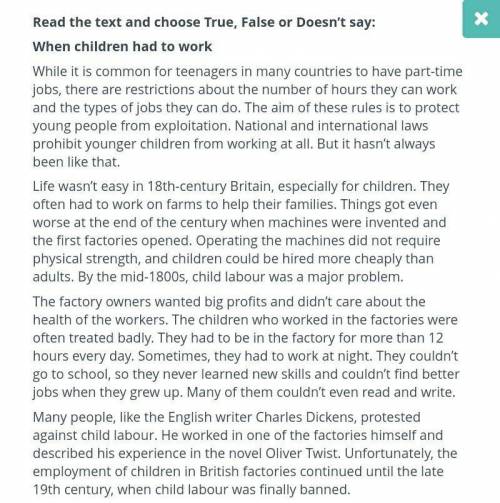2. Children in the early 1700s often worked in factories. Doesn't say
True
False.
3. In the past, factory owners employed children because child about was sheaper.
Doesn't
True
False.
4. Some children had to work on Saturdays and Sundays.
Doesn't
True
False.
5. They learned useful skills in the factories and found well-paid jobs when they grew up.
Doesn't
True False.
6. The English writer Charles Dickens believes that children shouldn't have to work.
Doesn't
True
False.
7. The employment of children in British factories continued intil the 20th century.
Doesn't
True
False.
в текст смотрите и сделайте

Другие вопросы по теме Английский язык
Популярные вопросы
- Характеристика гариса с роману п*ятнадцялетний капитан...
3 - Скаким событием связано строительство хошеутовского ,♥!...
2 - 140-(а+25)=40 340+(190-х)=400 100-(х+25)=52 280-(х+40)=80 60х+180=420...
1 - Найдите значение выражения: 7,8*4,6-26,28...
1 - Нужно анализ стихотворения тютчева не раз ты слышала признанье...
2 - Вычислите массу оксида алюминия, которая получится если в реакцию...
3 - 1состав придложения су словом ,пробежка 2 подабрат проверочное...
1 - Яке найменше число задовольняє нерівність: m 13\5...
1 - Орфографический разбор слова потрудиться...
1 - Решить. два поезда одновременно отправились навстречу друг другу...
1
1.There are international laws against child labour.(TRUE)
2.Children in the early 1700s often worked in factories.(FALSE)
3.In the past, factory owners employed children because child labour was cheaper. (DOESN'T SAY)
4.Some children had to work on Saturday and Sunday.(DOESN'T SAY)
5.They learned useful skills in the factories and found well-paid jobs when they grew up.(FALSE)
6.The English writer Charles Dickens believes that children shouldn't have to work. (TRUE)
7.The employment of children in British factories continued until the 20th century.(FALSE)
Делала сама(если неправильно извините)